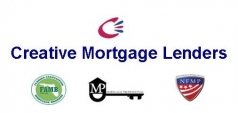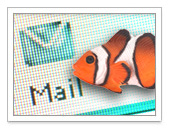
|
Follow Me On: |
 |
Jeannie O'Grady Mortgage Loan Originator, NMLS #209607 Creative Mortgage Lenders, NMLS #247952 Phone: Cell/Text: (727) 542-7001 Fax: (727) 823-0687 License: 209607 Jeannie@CreativeMortgageLenders.com www.CreativeMortgageLenders.com |
 | ||
| ||||
January 2010

|
Do Not Go Phish Keeping Your Personal Data Safe
Your mother may have told you to trust people and to give them the benefit of the doubt. But when you are on the Internet it's best to live by the words of an old French proverb: Skeptics are never deceived. While most people using the Internet are trustworthy, the few that aren't can wreak havoc and cause you major headaches if they get hold of your personal information. That's why it's best to be a skeptic when you log on. According to a 2007 survey by the Gartner group, more than $3.2 billion was lost in phishing scams successfully carried out on over 3 million people. The Anti-Phishing Working Group found that 95% of scams reported on their site were related to financial services and Internet retailers. These sites and surveys can help us, as Internet users, learn to be good skeptics. What is Phishing? Phishing is an attempt to obtain your personal information using false pretenses. The methods hackers use to get your data include misrepresentation in emails, fake navigation and phony websites. For example, let's say you receive an email that appears to come from your bank, and even features your bank's logo! The email may say that you need to update your account immediately or it will be closed. However, the link in the email does not take you to the bank's website. Instead, it takes you to a phony website that the hacker has created. This website includes a form that asks for your personal information like your name, account number, etc. Once you input the data and click submit the hacker now has your information. With this, he can start the process of stealing your financial identity. And we have all heard the nightmares of people trying to fix that situation. So your best bet is to avoid being scammed right from the start. Tips to Avoid Becoming a Casualty of Phishing There are many good websites with tips on how to avoid scams. One site, Hoax-Slayers, has a great page of information on recognizing, avoiding and reporting phishing scams. But the bottom-line to recognizing a scam is to ask the questions that a skeptic would ask:
The truth is financial institutions and online retailers are very aware of existing phishing scams and want consumers to be educated in what their companies will never do. For example:
The bottom line is that any reputable company will never send out emails requesting personal information. If you get an email that looks like it has come from a real company, don't click on the link in the email. Instead, open up a new browser window and type the URL of the company directly into the address bar. This way you can be sure that you are at the real address and are not redirected to a fake website. In addition to your own healthy skepticism, make sure that your computer's web browser is the latest and greatest. Many web browsers, such as Microsoft's Internet Explorer version 8 and Mozilla's Firefox version 3.5, have built-in website detection that can check links against reported phishing sites and warn you if a site may be suspect. To view information on IE 8's security features, go to Microsoft's website: http://www.microsoft.com/windows/internet-explorer/features/safer.aspx To check out Firefox 3.5's security features, go to: Reporting Phishing Scams The best way to help stamp out phishing scams is to report them. By reporting false sites from phishing emails, Internet browsers can add these bogus websites to their database and you can help other people from falling victim to the same scam.
You can also forward a copy of the email to the Anti-Phishing Working Group at reportphishing@antiphishing.org or to the US Government's Computer Emergency Readiness Team at phishing-report@us-cert.gov. Here's to a little healthy skepticism and a lot of safe Internet surfing for everyone! | ||||||||||||||||||||||||||||||
Content provided by Jeannie O'Grady, your reliable and friendly Mortgage Loan Originator. Programs and information are subject to change at any time and without notification. Please consult Broker for details You are receiving a complimentary subscription to YOU Magazine as a result of your ongoing business relationship with Jeannie O'Grady. While beneficial to a wide audience, this information is also commercial in nature and it may contain advertising materials. INVITE A FRIEND to receive YOU Magazine. Please feel free to invite your friends and colleagues to subscribe. SUBSCRIBE to YOU Magazine. If you received this message from a friend, you can subscribe online. UNSUBSCRIBE: If you would like to stop receiving emails from Jeannie O'Grady, you can easily unsubscribe. Creative Mortgage Lenders, NMLS #247952 |
P.O. Box 76482 St. Petersburg, Florida 33734 Powered by Platinum Marketing © Copyright 2024. Vantage Production, LLC. | |||||||||


